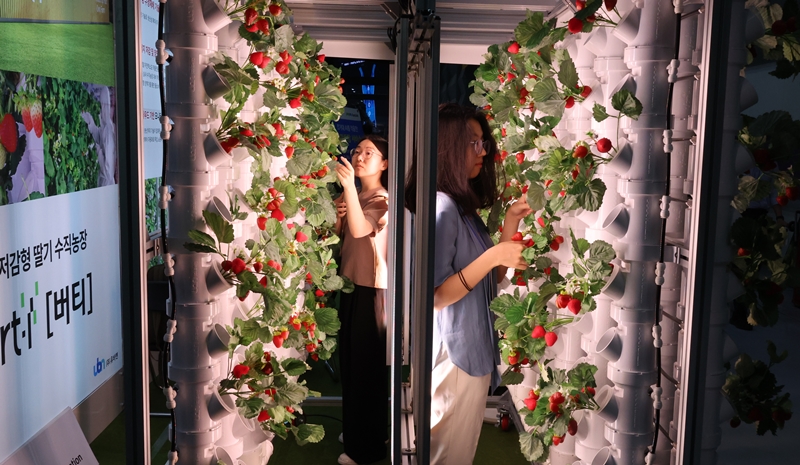
The Ministry of Agriculture, Food and Rural Affairs on July 26 announced the effectuation of the Act on Fostering and Supporting Smart Farming. Shown are visitors on July 25 watching a vertical strawberry farm at the Agri & Food Tech Start-up Rising Expo at COEX Mall in Seoul's Gangnam-gu District. (Yonhap News)
By Lee Kyoung Mi
The Ministry of Agriculture, Food and Rural Affairs will convert 30% of agricultural output to smart farming by 2027 and support technologies such as artificial intelligence (AI) and robotics to systematically incubate the smart farming sector.
With the sustainability of agriculture threatened by climate change and the aging of the rural population, the agricultural and food industries are responding by commercializing and expanding smart farming know-how.
Because of difficulties caused by the lack of a legal basis for systematic promotion and support for smart farming, the ministry said the enactment of the law is part of its efforts to improve the situation.
The first step is the drafting of the First Basic Plan for Fostering Smart Farming (2025-29) to form a comprehensive support structure allowing farmers and businesses to lead the innovation of the agricultural ecosystem.
The designation of smart farming incubation zones will connect smart farming produce and related industries and spread the use of AI-based data solutions for pest control and water management.
Another task is raising the capacity to use the technologies of farmers, companies and experts leading the spread of smart farming as well as their global competitiveness. For this, a certification system for smart farming managers with knowledge in information and communications technology and cultivation skills is slated for launch next year.
In addition to streamlining outdated regulations and systems, the law seeks to improve the quality of food for the public and raise the global competitiveness of K-Food Plus, a strategic export industry of agri-food products like smart farming and seeds combined with those from upstream and downstream industries.
km137426@korea.kr